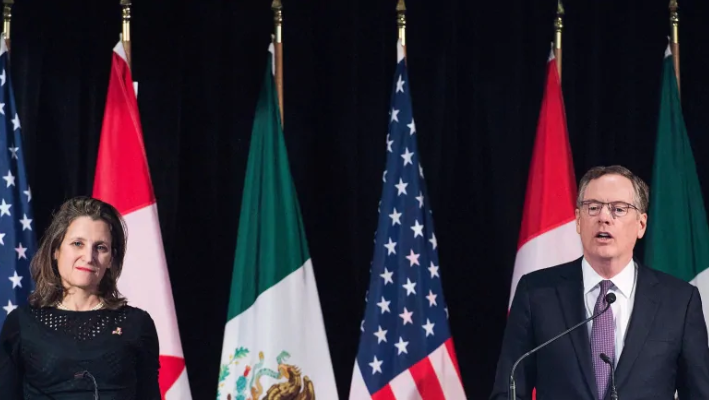
After more than a year of fractious negotiations, a deal has been reached
After more than a year of fractious negotiations, Canada and the U.S. have reached an agreement on key sections of a new North American Free Trade Agreement, a senior source told CBC News.
Prime Minister Justin Trudeau convened a late-night meeting of cabinet to brief ministers on the NAFTA progress, only hours before a U.S.-imposed midnight deadline.
At the heart of the deal is a trade-off between greater U.S. access to Canada’s dairy market, which is heavily protected by a system of supply management, and Canadian demands for the maintenance of a dispute resolution process, sources said.
In exchange for some U.S. concessions on a dispute mechanism, Canada is expected to give U.S. farmers greater access to Canada’s dairy market by increasing the quota on foreign imports.
Under the current supply management system, Canada imposes tariffs on dairy imports — which can run as high as 300 per cent — that exceed the established quota. Trump has railed against these tariffs as unfair to American farmers, as they are designed to keep foreign products out while privileging Canadian sources.
Sources said Canadian officials were going line by line through U.S. requests on dairy Sunday night before putting pen to paper on an agreement that could be politically challenging for the Liberal government, especially in Quebec, where dairy farmers hold electoral sway in certain ridings.
It was not immediately clear what Canada has agreed to on dairy.
At the outset of the NAFTA talks, the U.S. demanded Canada dismantle supply management entirely — something that Trudeau has maintained is a non-starter.
Canada has long sought to maintain Chapter 19 of the original NAFTA, the dispute settlement mechanism used to challenge anti-dumping and countervailing duty cases, which Canada has deployed in the past over the softwood lumber file.
Sources said the Americans have shown some movement on this file, despite entrenched opposition from U.S. Trade Representative Robert Lighthizer, that country’s chief negotiator, who believes this chapter violates U.S. sovereignty.
U.S. negotiators have been gunning for a new NAFTA by month’s end to get a text of the agreement to Congress for its mandatory 60-day review period. That could allow for a deal to be signed before Dec 1., when Mexico’s new, left-leaning president takes office.
Under U.S. law, while Congress can extend fast-track negotiating authority to Trump administration officials — as it has with NAFTA — legislators retain the right to review any proposed trade agreement and decide whether it will be implemented. That relationship is governed by a set of strict, legislated timelines that allow Congress enough time to study a deal before delivering a decision.
What remains less clear at this point is how Canada’s demands for relief from punitive U.S. tariffs on steel and aluminum exports will be resolved.
Those tariffs were levied on “national security” grounds using presidential authority granted under Section 232 of the Trade Expansion Act of 1962, which gives the president broad powers to impose tariffs without consulting Congress. Canada responded to Trump’s move with counter-tariffs on billions of dollars worth of U.S. goods.
While technically separate from ongoing NAFTA talks, the U.S. has used the threat of further 232 tariffs on autos to extract concessions from Canada and Mexico — a frightening proposition for the Canadians.
According to the U.S. Trade Representative, Canada ships more than $56 billion worth of autos — cars and parts alike — to the U.S. each year. The auto industry employs more than 120,000 people in Canada, with most of those jobs concentrated in southwestern Ontario.
A Mexican intervention?
Last month, Trump announced his negotiators had reached a bilateral deal with Mexico.
He outlined the deadline — Sept. 30 at midnight — for the text of that deal to be submitted to Congress. Canada would be allowed on board, he explained, but they’d have to agree to the terms spelled out in the bilateral agreement.
Trump made it clear Canada’s failure to join would be unacceptable, with hefty auto tariffs as a consequence.
Mexico’s new president-elect, however, said in an interview Friday that he has agreed to push the American side to make a deal with Canada.
President-elect Andres Manuel Lopez Obrador said Trudeau asked him during a Thursday phone call “to intervene and call on the U.S. government to reach an agreement” with Canada on the renegotiation of NAFTA.
“We agreed to that,” Lopez Obrador told reporters in Mexico City. The president-elect also said he would insist on a trilateral pact.
However, later Friday evening, Lopez Obrador’s Senate leader, Ricardo Monreal, said Mexico wouldn’t walk away from a bilateral agreement.


